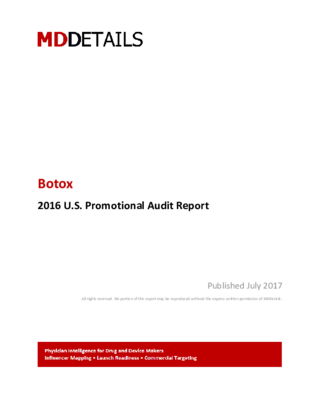Botox 2016 report
Botox 2016 U.S. PROMOTIONAL AUDIT REPORT
Published July 2017 • 31 Pages
The 5 Key Questions Addressed by this Report:
- How many physicians were reached by Botox through personal promotion in 2016 and how does this compare to its peer set in the Blepharospasm, Facial Wrinkles, Glabellar Lines, Hyperhidrosis, Migraine, Muscle Spasticity, Overactive Bladder, Strabismus, and Torticollis markets?
- What promotional mix was leveraged (e.g., sales rep detailing, physician education, and paid speaking) and what was the median spend on each type of activity?
- How does Allergan’s depth of coverage vary within key specialties (e.g., Neurology, Ophthalmology, Urology, Optometry, Dermatology, Plastic Surgery, and Physical Medicine and Rehabilitation) and how does this compare to its peers and the overall set of rep-accessible physicians?
- How often are physicians receiving paid meals for Botox throughout the year (e.g., monthly, quarterly, annually)?
- Who were the most detailed prescribers and top paid speakers for Botox in 2016?
Data Sources and Methodology:
- MDDetails leverages company-reported financial transaction data disclosed through CMS Open Payments. This data set captures all transfers of value (e.g., speaking fees, consulting fees, travel, education, and meals) made on behalf of a drug or device manufacturer to a physician. Currently, 42 months of longitudinal data is available – covering payments to more than 900,000 U.S. healthcare professionals.
- Over 31,000 paid interactions across 14,700 physicians made on behalf of Botox were carefully examined to support our analysis. In addition, interaction data from 18 peer products (e.g. Amrix, Bupap, Cambia, Dysport, Gablofen, Lorzone, Myobloc, Myrbetriq, Onzetra Xsail, Relpax, Sumavel Dosepro, Toviaz, Treximet, VESIcare, Xeomin, Zecuity, Zembrace, and Zomig ) was leveraged to provide benchmarking and market insights.


